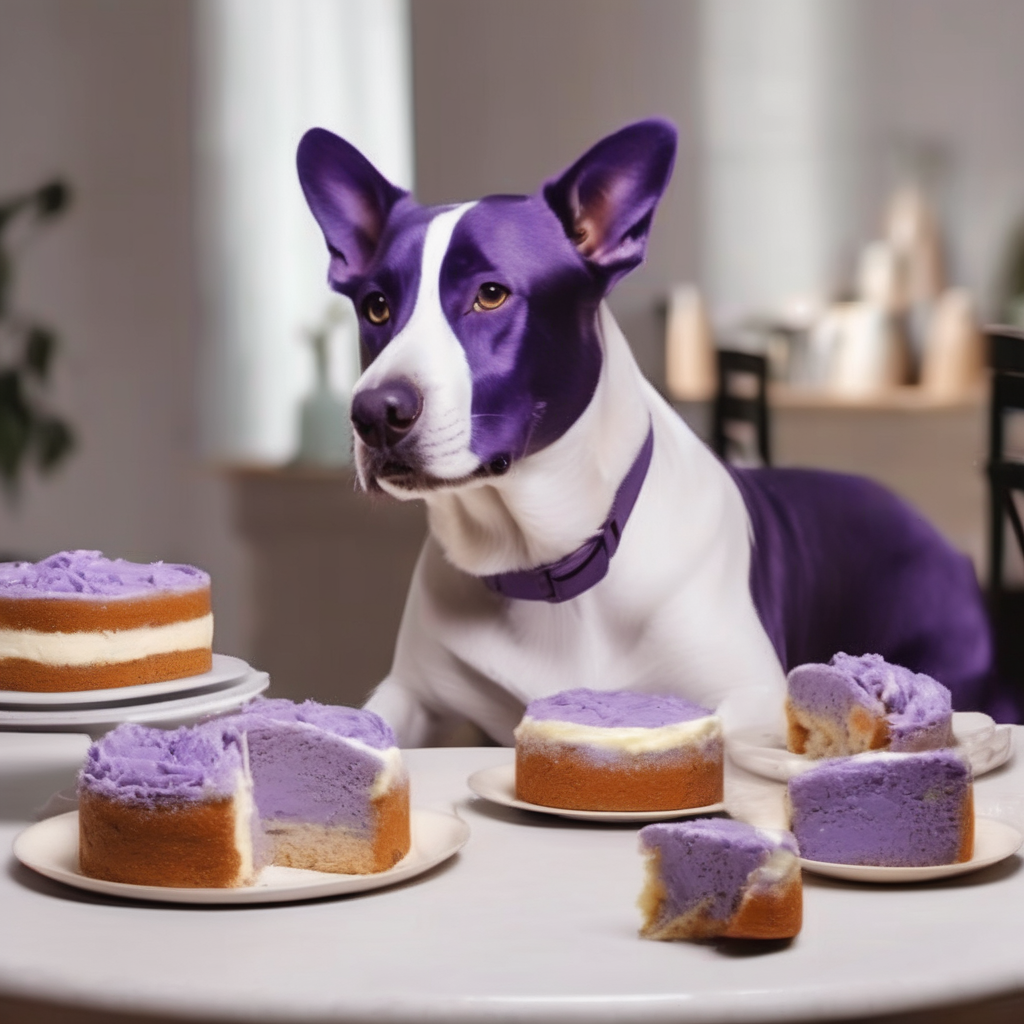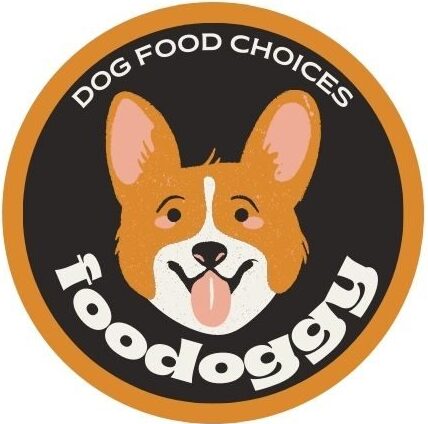Have you ever been enjoying a gorgeous piece of ube cake and looked down to see those puppy-dog eyes begging for a bite? If you’re a dog owner, you know the struggle of resisting those pleading eyes. But, is it okay to give your furry friend a slice of the sweet, purple delicacy? This question, often asked by many loving dog owners, can dogs eat ube cake?
No, dogs shouldn’t eat ube cake. Dogs are man’s best friend, and it’s only natural to want to share our joys with them – including culinary delights.
So, let’s take a close look at the ingredients of ube cake and analyze whether sharing this sweet indulgence with your pooch is a good idea.

What Is Ube?
Drifting away from the conventional, let us take a journey to the land of exotic flavors and vibrant colors. Welcome to the world of Ube.
Ube, pronounced as ‘ooh-beh,’ is a tropical tuber native to the Philippines and has been captivating the food world with its unique charm. The royal purple hue and subtly sweet, nutty flavor make it a crown jewel among root vegetables. But what makes ube truly stand out is not just its unique aesthetics but its health benefits as well.
Often dubbed as the ‘Purple Yam,’ this vibrant vegetable is packed with powerful antioxidants called anthocyanins. These are the same compounds that give blueberries and red wine their acclaimed health benefits. The high fiber content in ube aids in digestion, while its low glycemic index makes it an ideal choice for those managing their blood sugar levels.
In the culinary world, ube is a versatile superstar. From traditional Filipino desserts like halo-halo and ube jam to modern adaptations like ube pancakes and ube lattes, this purple yam is transforming dishes worldwide.
So, why not step out of your comfort zone and give this purple powerhouse a try? Not only does it promise a unique culinary experience, but it also brings numerous health benefits to the table.
What Is the Difference Between Ube, Yams, Sweet Potato, and Taro?
Having explored the wonders of ube, let’s plunge deeper into the labyrinth of tubers. Are you ready to decipher the mysteries between ube, yams, sweet potatoes, and taro?
Firstly, let’s get one thing straight, not all purple foods are created equal. While ube, also known as purple yam, is a distinct, vibrant purple, it should not be mistaken for other tubers. It has a unique flavor, often described as a cross between vanilla and pistachio, with a subtle sweetness that is perfectly suited for desserts.
Now, let’s talk about yams. In many parts of the world, the term ‘yam’ is used interchangeably with ‘sweet potato’, but they are, in fact, different species. Yams are usually larger, have a rough, brown skin, and tend not to be as sweet as sweet potatoes.
And then, we have the sweet potato, which can range in color from white to orange and, yes, even purple. But remember, a purple sweet potato is not an ube. Sweet potatoes have a softer texture and a flavor that is, well, sweeter than yams.
Last but not least, taro. It’s often confused with ube because of its purple flesh, but its taste and texture are quite different.
Health Benefits of Ube for Dogs
Feasting on the flavorsome knowledge of the distinct differences between ube, yams, sweet potatoes, and taro, let us now explore the hidden treasure of ube for our canine companions.
Health is wealth, this adage holds true not just for us humans, but for our four-legged friends as well. Ube, with its vibrant purple hue and sweet, nutty taste, isn’t just a treat for our taste buds, but a boon for your dog’s health.
Enriched with potent antioxidants, vitamin A, C, and E, this purple yam is a powerhouse of nutrients. Offering an immunity boost and promoting eye health, it’s a delicious and nutritious addition to your dog’s diet. Moreover, it’s high fiber content aids in digestion, making it an ideal choice for dogs with sensitive stomachs.
But as with anything, moderation is key. Too much of anything, even something as beneficial as ube, can lead to unwanted health issues. Therefore, it is crucial to balance it with other dietary elements.
So, why not add a dash of purple to your dog’s meals? Not only will it bring a change of taste, but also a heap of health benefits.

Can Dogs Eat Ube (Purple Yam)?
Firstly, let me assure you that ube is not toxic to dogs. In fact, it is a unique source of vitamins, minerals, and fiber. These nutrients can strengthen your dog’s immune system, aid digestion, and promote healthy skin and coat. However, it’s crucial to remember that moderation is key. Offering too much of this starchy vegetable can lead to weight gain and other health issues.
Just as you wouldn’t want to overindulge in a treat, the same applies to your dog. The secret to using ube as a health booster for your pet lies in the portion size and preparation methods. Opt for boiled or baked ube without any added sugars or artificial flavors to maintain its nutritional integrity.
As a responsible and loving pet owner, it’s not just about what your dog can eat, but also what is best for them. Incorporating ube into your dog’s diet can be a wonderful way to add variety and essential nutrients. However, always remember to consult with your vet before introducing new foods into their diet.
Can Dogs Eat Ube Cake?
It’s not just about taste; it’s about health. After all, their well-being is our utmost priority. The foods we enjoy might not always be safe for our four-legged buddies.
Contemplating whether your pet can enjoy ube cake? Let’s dive into two critical aspects: safety and health. The first question to consider is, Is ube cake safe for dogs? Dogs’ dietary needs are different from ours, and certain human foods can be harmful to them. Secondly, it’s essential to ask, Is ube cake healthy for dogs? Even if food is safe, it might not be the best choice for your pet’s health. Join us as we explore these topics, providing you with informed decisions about including ube cake in your pup’s diet.
Is Ube Cake Safe for Dogs?
While it’s clear that ube, in its raw form, is benign to dogs, the ube cake is a different story. Ube cake is typically laden with sugar, dairy, and other potentially harmful ingredients for dogs such as chocolate or raisins. Additionally, they can contain artificial sweeteners like xylitol, which are lethal to dogs.
To keep your furry friend safe, it’s advisable to resist their pleading eyes. The safety of your pet is always paramount.
Is Ube Cake Healthy for Dogs?
Consider the ingredients that usually compose an ube cake: ube, sugar, flour, eggs, and butter. While ube itself is a nutrient-dense food, the remaining ingredients are not as beneficial to a dog’s health. Sugar, for example, is known to lead to obesity, dental issues, and even diabetes in dogs. Butter, rich in fats, can trigger pancreatitis, a dangerous inflammation of the pancreas. Flour and eggs, although not harmful, don’t contribute significantly to a dog’s nutritional needs.
In essence, the ube cake, while a delightful treat for humans, is not a healthy choice for our furry friends. Your dog might be lured by the delicious scent of this cake, but remember, a dog’s health is the ultimate luxury.
Read More Here: Can Dogs Eat Ginger Cake?

Can Dogs Eat Ube Ice Cream?
As dog owners, we often find ourselves wondering if this vibrant purple dessert is a safe treat for our furry friends. The answer, unfortunately, remains the same – it’s best to avoid feeding your dogs ube ice cream.
You might ask, why not? After all, they’ve shared your joy over a bowl of ice cream on a sweltering summer day. But remember, not all human food is safe for dogs. And, ube ice cream is no exception.
Let’s delve into the reasons. Firstly, most ube ice creams contain milk and sugar, two ingredients that are not friendly to a dog’s digestive system. Dogs can be lactose intolerant, and sugar can lead to obesity and diabetes.
Secondly, ube ice cream might contain artificial sweeteners, especially xylitol, which is highly toxic to dogs. Even a small amount can lead to a rapid insulin release, causing hypoglycemia (low blood sugar), and severe liver damage.
Lastly, the intense purple color of the ice cream you love so much often comes from food dyes, which can cause allergic reactions in dogs.
Can Dogs Eat Ube Bread?
Ube bread is a popular Filipino delicacy, known for its distinct purple color and sweet, rich flavor. It’s a tasty treat that many people, including dog owners, find hard to resist. But the question remains, Is it safe for dogs?
Well, the answer is a little complex. Ube bread, like ube ice cream, contains ube – a root vegetable that is generally safe for dogs in small amounts. However, the other ingredients used in the bread may not be as safe.
Commercially made ube bread often contains sugar, butter, and other ingredients that are not ideal for dogs. Even if your furry friend seems to enjoy the taste, regular consumption could lead to obesity, dental issues, and other health problems. Plus, some breads may also contain raisins or chocolate, which are toxic to dogs.
So, the next time you’re tempted to share a bite of your ube bread with your dog, remember that not all human foods are suitable for dogs.
Conclusion
Feeding your dog with ube-based products like ube cake, ube ice cream, or ube bread should be done with caution. While ube itself is not harmful to dogs, the additional ingredients found in these processed foods may not be suitable for your pet’s diet.
Always prioritize your dog’s health. It’s essential to understand that not everything we humans enjoy eating is equally beneficial for our furry friends. When in doubt, always consult with your veterinary nutritionist for the best dietary advice.
